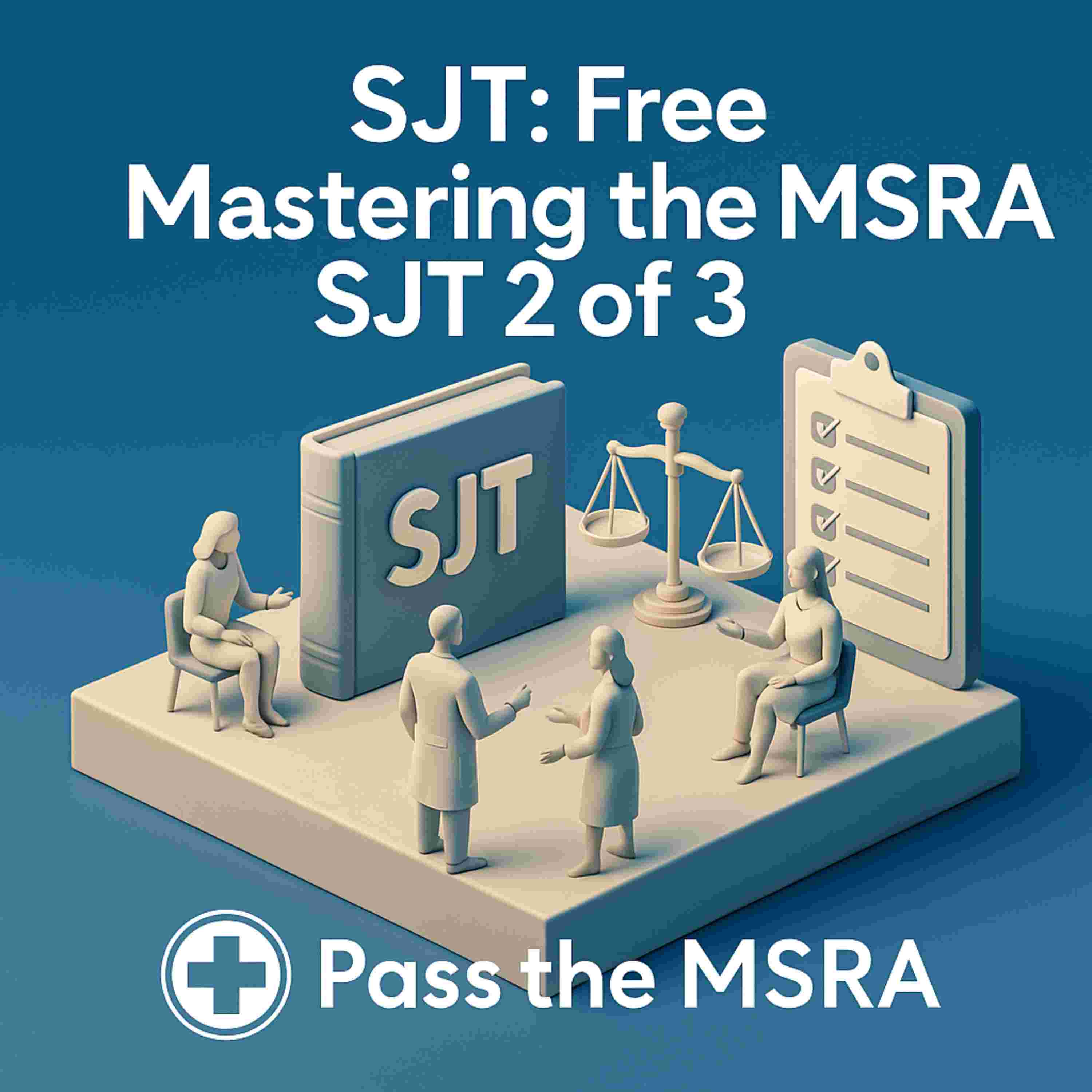

Free MSRA SJT deep dive—practical, high-yield, and jargon-light. We cut dense UK guidance (GMC Good Medical Practice 2024, Montgomery 2015, MCA 2005, Equality Act 2010, Accessible Information Standard, PSIRF/LFPSE) into real-world tools, mnemonics and checklists so you can think clearly under pressure and score safely.
What you’ll learn
• Core Mindset: Patient safety first; escalate early; act within competence; if it’s not documented, it didn’t happen.
• Ethics & Law (Adults): Shared decision-making, material risks (Montgomery), valid consent beyond a signature, teach-back, meticulous documentation.
• Children & Young People: Gillick competence & Fraser guidelines; 16–17s and FLRA; confidentiality with safeguarding limits.
• Capacity (MCA 2005): Five principles; two-stage, decision-specific test; maximise capacity; best-interest decisions using the least restrictive option; IMCA trigger.
• End of Life: DNACPR = CPR only (all other appropriate care continues); ADRT validity/applicability; LPAs within scope; sensitive conversations, clear notes.
• Resource Stewardship: Prioritising by clinical risk/benefit; fair allocation; equity lens (Core20PLUS5); avoid unnecessary tests; flow thinking.
• Equality, Diversity & Inclusion: Equality Act duties; zero tolerance of discrimination/microaggressions; reasonable adjustments; AIS (professional interpreters—never children).
• Communication Skills: SPIKES for breaking bad news; active listening (ICE/NURSE/teach-back); de-escalation; working with relatives & carers; safe use of interpreters.
• Time & Task Management: “Sickest first”, SBAR, Now–Next–Later boards, safe delegation (five rights), closed-loop communication, visible ownership and deadlines.
• Errors, Complaints & Candour: Prompt, sincere apology (not admission of liability); LFPSE reporting; PSIRF learning; practical complaint handling (acknowledge–apologise–action).
• Reflection & Learning: Safe, anonymised reflective practice (WSN: What/So-what/Now-what); turn learning into change.
• Supporting Colleagues: Just culture, compassionate support after incidents, safe removal from duties if impaired.
• Self-Care & Resilience: Recognising burnout (ICD-11), seeking help (e.g., Practitioner Health/BMA support), work-life balance, recognising your limits and asking for supervision.
• Safeguarding: Children (Working Together 2023; S17/S47; bruising in pre-mobile infants = red flag); Adults (Care Act S42; domestic abuse—DASH/MARAC; make-safeguarding-personal); accurate, contemporaneous notes and lawful information sharing.
• Scenario Technique (Exam): Pick-3 and rank-5 strategies; harm-minimisation; stabilise-escalate-document; penalise delay, dishonesty, unsafe delegation.
Handy mnemonics featured
• MATERIAL (consent), Consent-5, 4C-BEST (capacity), AIS-5, NOW–NEXT–LATER + ODT (owner/deadline/threshold), 3As (complaints), WSN (reflection).
Exam mindset refresher
Safety first → escalate early → candour when things go wrong → share the minimum necessary via secure channels → use professional interpreters → document everything.
Resources
• PassTheMSRA – Home: https://www.passthemsra.com
• SJT for the MSRA (course): https://www.passthemsra.com/courses/sjt-for-the-msra/
• SJT Mock Papers (x10): https://www.passthemsra.com/courses/sjt-msra-mock-papers-x-10/
• YouTube (free videos): https://www.youtube.com/@PasstheMSRA
Categories / Key Themes
SJT, Professionalism & Integrity, Patient Safety, Consent & Capacity, DNACPR/ADRT/LPA, Confidentiality & GDPR, Equality & AIS, Safeguarding, Communication Skills, Time & Task Management, Candour & Complaints, Reflection, Teamwork & Leadership, Exam Technique
Tags
#MSRA #SJT #GMC #PatientSafety #Candour #Consent #Capacity #DNACPR #Safeguarding #Equality #AIS #Communication #Leadership #UKFPO #NHS #ExamPrep #GPTraining
Educational only—always follow your local policies and current national guidance.